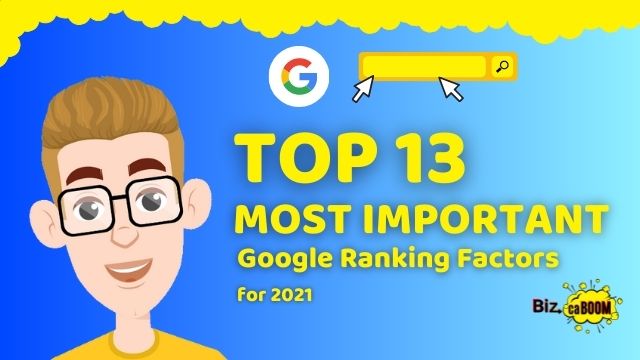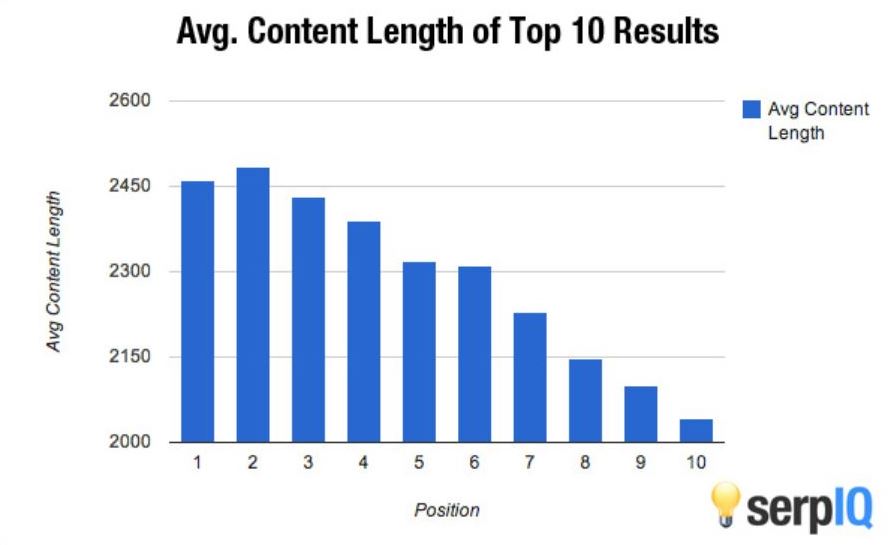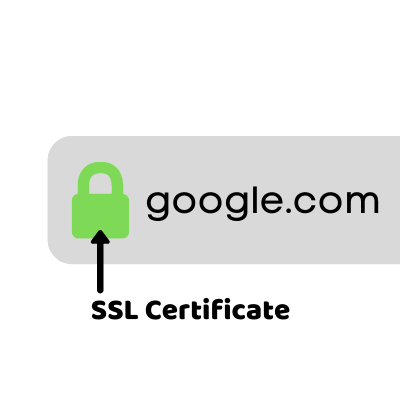
How to Rank Number One on Google
How to Rank NUMBER ONE (#1) on GOOGLE | BizcaBOOM The goal of getting to the top of Google’s number one search results is something

These Google ranking factors is a list of criteria’s that Google uses to rank websites. Google has been known to change these factors as time goes on, so businesses can find it difficult to remain in the loop.
That’s why we have put together the TOP 13 most important Google ranking factors for 2021 that will help you know what Google is looking for and how your site stacks up! To rank in Google, there are two different aspects to determine:
1) On-page SEO
2) Off-page SEO

On-Page SEO is a set of on-page factors Google uses to rank your site. On-Page SEO is a fundamental block that is highly important for ranking on Google. Google looks at the following:
Content on your page and keywords within your content.
Readability: Is your content easy to read? Google prefers shorter sentences and paragraphs with a clear flow from one idea to another. Lengthy blocks of text should be broken up into smaller, more readable pieces so that visitors are better able to comprehend the content.

Off-Page SEO is everything outside of Google’s search engine algorithm that might affect how high or low your web pages show in Google’s rankings when they’re searched for by someone who isn’t logged in as an advanced user (which most people are).
These could range from social media posts, links between sites, reviews online, and the essential factor of all, backlinks!
Content is king, and Google pays special attention to content quality. It is the MOST important ranking factor. You must create unique, updated, and valuable content if you want to rank higher in the search engines pages (called SERP). But what exactly defines “content quality” for Google?
Google places a premium on content that’s both fresh and original. To ensure your SEO is successful, you need to write articles that answer the reader’s questions, provide value, and are original.
Publishing duplicate information or publishing similar content to other web pages can hurt your SEO. For beginners, Google will not index or rank your website if it’s a duplicate of an existing webpage.
If you frequently publish duplicate entries for search terms on your site, Google may reduce the crawling rate of your website below what is considered normal levels.
To prevent this from happening more than once (and in so doing protect its rankings), make sure when creating content that it’s both new and different from those ranking highest in SERP.
Keeping content fresh is one strategy that can help websites to rank better on Google. Fresh content usually includes up-to-date information like new research, latest news, and current trends.
Websites such as Google Trends provide an easy way to find the most updated information online. This amazing tool (owned by Google) shows you what topics are trending and engaging your audience.
Use these to help you write content that attracts a greater reader base.
Long or short content?

Probably, the most popular question asked online relates to the length of content in Google ranking factors. Is it true?
The answer to that question is yes. As shown by different analyses, content length affects the rank of your website on search results. According to the study above by SerpIQ, blog articles over 2000 words tend to rank at the top of Google more often. However, there is no strict word limit to stick to when writing content.
The best approach to thinking about this is using a deep and thorough approach in your business blogging.
Google prefers a website with pages that cover a topic comprehensively and provide extensive solutions to rank higher on search engines and be found by consumers looking for products or services in the market.
Another important ranking factor for ranking on Google is organization.
You need to provide visitors with the right solution to their difficulties using different headings and subheadings. Use wisely HTML tags like H1, H2, H3, H4 (you can have h5, h6) to give a better organization of your content.
It is also possible to insert HTML codes for bullets and numbered lists to organize content better. These features are picked up by Google now, which allows the company’s search engine to display them as feature snippets for different keyword phrases.
Tip – When writing your article, consider the flow and see which sections to include first. For example, if you were writing a recipe for an apple pie, cooks would benefit from seeing the specific ingredients they need before reading how to make this item in detail.
By focusing on ergonomics when structuring your content, users will enjoy a better user experience of your site and indirectly improve your chances for Google ranking.

Some Google ranking factors also include an understanding of the search intent of users. For example, everyone searching for “best guitar” in Google will find articles about what makes a guitar one of the best, and not just a listicle.
Here’s an example. When you search the phrase “how to make an apple pie” in Google, it will show instructions and tutorials, as well as videos.
So if you want to write an article about cooking or making a recipe of some sort for this keyword phrase, make sure you address the search intent with your content and create the correct type of content that matches what people are searching for online.
Besides search intent, the “buyer’s journey” tells marketers where their website visitors are in the sales process.
Often, it is hard to tell whether someone is browsing or ready to purchase your products, as people may research a topic at different stages of commitment.
By matching a visitor’s intent with content that fits their need, you’re more likely to answer questions and lead them through the remainder of the sales funnel.
Google is taking into consideration the speed of your website when ranking. The best way to improve the speed of your site is by using page-builder tools like LeadPages because it can help you create faster landing pages and squeeze in more keywords onto the page, leading to increased organic traffic for your site.
In the digital age, page load time is a huge ranking factor for Google’s search engine. Websites need to load fast and provide an optimized user experience. Speed results can be measured using Google speed results or any other tool that can measure the speed of your pages.
Google’s latest technology will help analyze your site, offer advice for improving page speed, and identify ways to get a higher search ranking.
For example, you can ensure that your website loads quickly by using a CDN service even if someone is viewing it from another part of the world.

After the world went mobile-first back in 2019, Google switched to an indexing approach based on your site’s mobile responsiveness.
This means that instead of browsers picking and choosing from your desktop version for indexing purposes, they will take your website’s mobile environment into account because it has quickly become so popular, with more than 5.27 billion users being connected by smartphone.
Mobile-first design also ensures a better browsing experience and benefitting SEO efforts due to the simplicity of direct links and having no need for redirects or app download pages since everything is condensed into one page.
As mobile searches have overtaken the desktop, it’s important to make your site optimized for mobile. You need to find a solution to have a well-optimized website.
Google looks for websites that are a reliable source of information about a given topic. Domain authority (DA) is Moz’s estimation of how authoritative and knowledgeable your website is about topics impacting Google rankings.
Domain Authority is a major Google ranking factor and the scores range from 1-100, with highly authoritative websites scoring higher than lower ones. How do you improve your DA?
You need to increase the number of high-quality backlinks pointing to your site or revise old content so it talks more directly about ranking on search engines. To rank well on Google, create content that’s tailored to your industry.
You can find out which topics are popular with your audience by using many tools built for Google Analytics.
You can increase your topical authority by creating high-quality articles about this subject. In this way, Google will start recognizing you as an authority in the field, boosting your DA and ranking top 10 in search results.
An essential ranking factor is keyword density. You must have keywords on your site to find you when they search for certain topics.
To make sure your site is searchable, here are some keyword optimization tips:
Another important Google ranking factor is the structure of your website.
It is also important to have a site’s architecture in mind when making your website, leading to better data. A sitemap is a simple map of your site that includes all the most important pages you want search engines to find.
Setting up a site map for your website helps the Google spider crawl easier, find new articles, and index pages.
You can use different tools (or plugins if you’re on WordPress) to create a simple sitemap for your website. Google crawlers are the tools that help the search engine to index your website.
This is accomplished by file robots.txt in a WordPress blog or using the Google Webmaster Tools console, which helps determine which pages search engine crawlers (called spiders) can crawl and which cannot.

A site’s security is nowadays (and in the future as well) a major and important Google ranking factor, and to be competitive today, means rolling out HTTPS.
If you have a website that does not use HTTPS, you should switch to it. You can find different online services (paid and free) that will give you a good certificate.
Google considers several factors when ranking your web pages, but the most important aspect is user experience.
Do you know that Google can measure this too? Google has a proprietary algorithm (called RankBrain) that incorporates other factors that are essential for it:
What are Backlinks?
After the content, backlinks are is the second most important Google ranking factor. Links to your website serve as a type of content themselves, and without links to other sites, a webpage really can’t be taken advantage of by search engine crawlers.
The bottom line is that by acquiring links from high authority websites with your content, Google will see that your content is trustworthy. Votes for the quality of your website’s SEO.
Do backlinks matter for site ranking? They help determine where a page ranks in search engine results pages (SERPs). Simply put, more votes can land you higher on SERP listings than fewer votes.
To find good backlinks, Google Search Console is your best bet. Google’s crawlers will crawl the links to identify if they’re low quality, spammy, or both and help you see which domains are linking to yours so that you can reach out with a request for more high-quality links.
You’ll also want to use Google Analytics (GA) Audience Intelligence tool as it provides insight into topics related to your business based on sites linking in from external sources such as social media posts, blogs, forums, etc., and Google Trends offers web data about search volume over time across various regions around the world.
You may get great insights by combining GA tools with other SEO tools like Ahrefs or SEMrush. Along with Google Search Console, you’ll want to use social media signals.
Social media is a big influencer, and Google’s crawlers will crawl links from social platforms like Twitter, Facebook, Linked In, and more. Google Analytics is an amazing tool that will tell you how many people are talking about your content on those networks, indicating popularity that Google may consider when determining rank in search engine results pages (SERPs).
You might also find yourself using tools for outreach such as BuzzSumo or Ahrefs Content Explorer to see who has linked to similar articles so you can reach out with requests for quality backlinks.
Tools like these give insight into topics related to your business based on sites linking in from external sources.
These are some of the most important Google ranking factors for 2021. Make sure to implement them into your SEO strategy so you can start seeing results!

If you ever need a helping hand in getting your company or home service business at the top of Google, look no further and book a call with BizcaBOOM, an SEO Company in Houston, so that you can get more calls coming in. Or if you’re in need of a professional web designer in The Woodlands, feel free to contact us here.
Now that you have learned our Top 13 most important Google ranking factors, why not share this post with your friends?
Spread the word out so we can continue to give you valuable SEO content!
Recent Articles:

How to Rank NUMBER ONE (#1) on GOOGLE | BizcaBOOM The goal of getting to the top of Google’s number one search results is something

How to Choose the Right Keywords for SEO Purposes | BizcaBOOM One of the most critical aspects of good search engine optimization is choosing the

Is SEO Better than Google Ads? SEO vs Google Ads Many businesses use marketing techniques such as search engine optimization (SEO) and Google Ads to

How to Rank NUMBER ONE (#1) on GOOGLE | BizcaBOOM The goal of getting to the top of Google’s number one search results is something

How to Choose the Right Keywords for SEO Purposes | BizcaBOOM One of the most critical aspects of good search engine optimization is choosing the

Is SEO Better than Google Ads? SEO vs Google Ads Many businesses use marketing techniques such as search engine optimization (SEO) and Google Ads to
Tell us about your company: